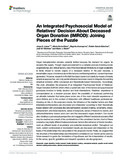Mostrar el registro sencillo del ítem
An Integrated Psychosocial Model of Relatives' Organ Donation (IMROD): joining pieces of the puzzle
| dc.creator | López Martínez, Jorge S. | es_ES |
| dc.creator | Soria Oliver, María | es_ES |
| dc.creator | Aramayona, Begoña | es_ES |
| dc.creator | García Sánchez, Rubén | es_ES |
| dc.creator | Martínez, José M. | es_ES |
| dc.date.accessioned | 2020-11-18T09:18:35Z | |
| dc.date.available | 2020-11-18T09:18:35Z | |
| dc.date.issued | 2018 | |
| dc.identifier.issn | 1664-1078 | |
| dc.identifier.uri | https://hdl.handle.net/2454/38728 | |
| dc.description.abstract | Organ transplantation remains currently limited because the demand for organs far exceeds the supply. Though organ procurement is a complex process involving social, organizational, and clinical factors, one of the most relevant limitations of organ availability is family refusal to donate organs of a deceased relative. In the past decades, a remarkable corpus of evidence about the factors conditioning relatives' consent has been generated. However, research in the field has been carried out mainly by means of merely empirical approaches, and only partial attempts have been made to integrate the existing empirical evidence within conceptual and theoretically based frameworks. Accordingly, this work articulates the proposal of an Integrated Psychosocial Model of Relatives' Organ Donation (IMROD) which offers a systematic view of the factors and psychosocial processes involved in family decision and their interrelations. Relatives' experience is conceptualized as a decision process about the possibility of vicariously performing an altruistic behavior that takes place under one of the most stressful experiences of one's lifetime and in the context of interaction with different healthcare professionals. Drawing on this, in the proposed model, the influence of the implied factors and their interrelations/interactions are structured and interpreted according to their theoretically based relation with processes like rational/heuristic decision-making, uncertainty, stress, bereavement, emotional reactions, sense of reciprocity, sense of freedom to decide, and attitudes/intentions toward one's own and the deceased's organ donation. Our model also develops a processual perspective and suggests different decisional scenarios that may be reached as a result of the combinations of the considered factors. Each of these scenarios may imply different balances between factors that enhance or hinder donation, such as different levels of uncertainty and potential decisional conflict. Throughout our work, current controversial or inconsistent results are discussed and interpreted on the basis of the relationships that are posited in the proposed model. Finally, we suggest that the structure of the relationships and interactions contained in our model can be used by future research to guide the formulation of hypotheses and the interpretation of results. In this sense, specific guidelines and research questions are also proposed. | en |
| dc.format.extent | 14 p. | |
| dc.format.mimetype | application/pdf | en |
| dc.language.iso | eng | en |
| dc.publisher | Frontiers Media | en |
| dc.relation.ispartof | Frontiers in Psychology, 2018, 9: 408 | en |
| dc.rights | © 2018 López, Soria-Oliver, Aramayona, García-Sánchez, Martínez and Martín. This is an open-access article distributed under the terms of the Creative Commons Attribution License (CC BY). The use, distribution or reproduction in other forums is permitted, provided the original author(s) and the copyright owner are credited and that the original publication in this journal is cited, in accordance with accepted academic practice. No use, distribution or reproduction is permitted which does not comply with these terms. | en |
| dc.rights.uri | http://creativecommons.org/licenses/by/4.0/ | |
| dc.subject | Organ donation | en |
| dc.subject | Family consent | en |
| dc.subject | Family decision making | en |
| dc.subject | Conceptual analysis | en |
| dc.subject | Psycho-social model | en |
| dc.subject | Decision making under stress | en |
| dc.subject | Altruism and prosocial behavior | en |
| dc.title | An Integrated Psychosocial Model of Relatives' Organ Donation (IMROD): joining pieces of the puzzle | en |
| dc.type | info:eu-repo/semantics/article | en |
| dc.type | Artículo / Artikulua | es |
| dc.contributor.department | Ciencias de la Salud | es_ES |
| dc.contributor.department | Osasun Zientziak | eu |
| dc.rights.accessRights | info:eu-repo/semantics/openAccess | en |
| dc.rights.accessRights | Acceso abierto / Sarbide irekia | es |
| dc.identifier.doi | 10.3389/fpsyg.2018.00408 | |
| dc.relation.publisherversion | https://doi.org/10.3389/fpsyg.2018.00408 | |
| dc.type.version | info:eu-repo/semantics/publishedVersion | en |
| dc.type.version | Versión publicada / Argitaratu den bertsioa | es |
Ficheros en el ítem
Este ítem aparece en la(s) siguiente(s) colección(ones)
La licencia del ítem se describe como © 2018 López, Soria-Oliver, Aramayona, García-Sánchez, Martínez and
Martín. This is an open-access article distributed under the terms of the Creative
Commons Attribution License (CC BY). The use, distribution or reproduction in
other forums is permitted, provided the original author(s) and the copyright owner
are credited and that the original publication in this journal is cited, in accordance
with accepted academic practice. No use, distribution or reproduction is permitted
which does not comply with these terms.



